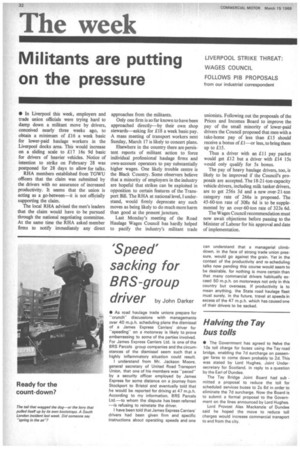Militants are putting on the pressure
Page 34

If you've noticed an error in this article please click here to report it so we can fix it.
LIVERPOOL STRIKE THREAT: WAGES COUNCIL FOLLOWS PIB PROPOSALS from our industrial correspondent
• In Liverpool this week, employers and trade union officials were trying hard to damp down a militant move by drivers, conceived nearly three weeks ago, to obtain a minimum of £16 a week basic for lower-paid haulage workers in the Liverpool docks area. This would increase on a sliding scale to £17 16s 9d basic for drivers of heavier vehicles. Notice of intention to strike on February 28 was postponed for 28 days to allow for talks.
RHA members established from TGWU officers that the claim was submitted by the drivers with no assurance of increased productivity. It seems that the union is acting as a go-between—it is not officially supporting the claim.
The local RHA advised the men's leaders that the claim would have to be pursued through the national negotiating committee. At the same time the RHA asked member firms to notify immediately any direct approaches from the militants.
Only one firm is so far known to have been approached directly—by their own shop stewards—asking for £18 a week basic pay. A mass meeting of transport workers next Sunday, March 17 is likely to concert plans.
Elsewhere in the country there are persistent reports of militant action to force individual professional haulage firms and own-account operators to pay substantially higher wages. One likely trouble centre is the Black Country. Some observers believe that a minority of employers in the industry are hopeful that strikes can be exploited in opposition to certain features of the Transport Bill. The RHA at national level, I understand, would firmly deprecate any such moves as being likely to do much more harm than good at the present juncture.
Last Monday's meeting of the Road Haulage Wages Council has hardly helped to pacify the industry's militant trade unionists. Following out the proposals of the Prices and Incomes Board to improve the pay of the small minority of lower-paid drivers the Council proposed that men with a take-home pay of less than £15 should receive a bonus of £1—or less, to bring them up to £15.
Thus a driver with an £11 pay packet would get £12 but a driver with £14 15s would only qualify for Ss bonus.
The pay of heavy haulage drivers, too, is likely to be improved if the Council's proposals are accepted. The 18-21-ton-capacity vehicle drivers, including milk tanker drivers, are to get 256s 3d and a new over-21-ton category rate of 266s is proposed. The 45-60-ton rate of 308s 6d is to be supplemented by an over-60-ton rate of 323s 6d.
The Wages Council recommendation must now await objections before passing to the Minister of Labour for his approval and date of implementation.




































































































































